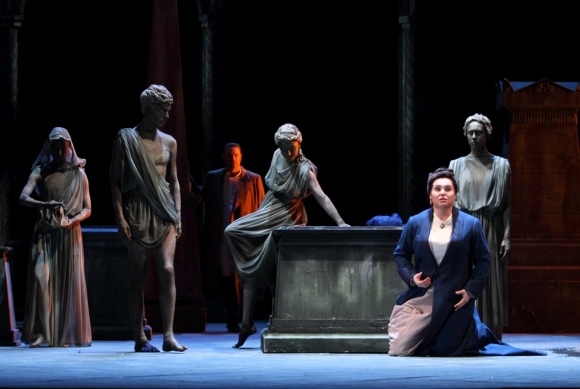Un ballo in maschera (Royal Opera House)
The much-anticipated new production of Verdi’s melodrama misses the mark

© Catherine Ashmore
Kicked around by censors who balked at the depiction of a monarch’s assassination, Un ballo in maschera (A Masked Ball) was mired in controversy from the start. It was quickly solved, though: a relocation from Sweden to Boston and some enforced name changes, chiefly that of King Gustavo to the somewhat humbler Riccardo, a mere Governor, made no difference to the opera’s essential storyline.
Rather more troubling to modern sensibilities are the opera’s patriarchal attitudes. It was the ironic James Thurber who said that ‘a woman’s place is in the wrong’, a macho attitude that prompts the virtuous Amelia’s jealous husband Renato to turn on her with lethal intent when he discovers – and misinterprets – what appears to be a dalliance with his master.
German director Katharina Thoma relocates Ballo, whose locale was neither here nor there even for Verdi, in an unspecified fin-de-siècle European country, with Riccardo as an Archduke-Tsar-like figure. However. if she wishes us to imagine calamitous wars or revolutions erupting as a result of the opera’s assassination it’s not something she follows through.
That’s par for the course in what turns out to be one of the year’s most disappointing new productions. Thoma’s only previous UK opera effort, Glyndebourne’s Ariadne auf Naxos, may have been misconceived but at least it was driven by a bold idea. This one is just dull. Characterisation is two-dimensional at best and there are moments of unacceptably shoddy stagecraft. The soothsayer’s hunchback assistant is straight out of a Mel Brooks movie, and when four statues rise from their tombs to signify impending death they are then given nothing to do. Worst of all, and I suspect unwittingly, Thoma transforms Verdi’s dying protagonist from hero to hypocrite by letting him get far too fresh with Amelia during the climactic ball scene.
At least Thoma has a soul mate in Daniel Oren, whose conducting matches her direction all the way. This is one of Verdi’s most arresting scores but you’d never know it. Ensemble within the orchestra and between pit and stage is very approximate; phrasing and coloration are perfunctory. And while the golden tenor of Joseph Calleja as Riccardo is its usual brilliant self, there’s nothing behind it. It’s empty. What on earth did Oren do with his star player during rehearsals?
Liudmyla Monastyrska, who sings Amelia, is always a formidable presence, but on this occasion some very strange things happened in her lower register. It was the Cilla Black effect of two different voices emerging from the same body. Her intonation was questionable too: not out of tune exactly, but with a good number of arrows missing the inner.
It took the chipper soprano of Serena Gamberoni as the page boy Oscar and Dmitri Hvorostovsky who, though sounding tired, sang a stylish Renato, to steady a ship that is barely seaworthy even on its maiden voyage. Its gunwales creaked like a self-scuppering relic of bygone battles and Soutra Gilmour‘s designs, big but fusty, were beset on opening night by some unfortunate am-dram moments involving recalcitrant sets and dropped props.
Yet none of Covent Garden's usual suspects booed this dog’s dinner at the curtain call. The Royal Opera, which suffers from fussy audience factions with no taste for challenging fare, has responded by chucking them a bowl of grey stew. They lapped it up.












